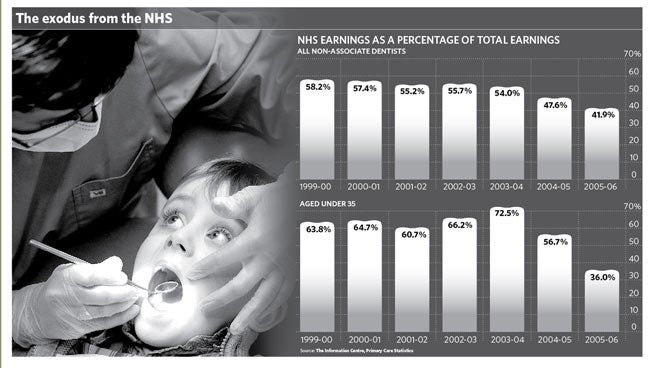NHS dentistry in crisis as record number of practitioners defect to private sector

The crisis in NHS dentistry is rapidly worsening because dentists are switching thousands of patients to private treatment, figures show.
NHS treatment is in free fall with a 16 per cent collapse in the proportion of dentist's earnings made from the NHS from the years 1999-2000 to 2005-06.
The figures, published by the NHS Information Centre, highlight the challenge facing the NHS after a survey, disclosed in The Independent yesterday, revealed that dentistry in England was the most expensive in Europe.
The fall in NHS earnings has accelerated in the past two years and is most pronounced among young dentists who are the future of the profession.
NHS incomes fell by over 20 per cent in a single year from 2004-05 to 2005-06, as a proportion of total earnings, among dentists aged under 35. Young dentists now earn on average only just over a third of their income (36 per cent) from the NHS.
Patients' organisations said the decline in NHS dentistry was alarming and could lead to the eventual collapse of the NHS dental service. Surveys show patients are having increasing difficulty in finding an NHS dentist and the Government admitted last year that two million patients who wanted access to an NHS dentist had failed to get it.
Anthony Halperin, chairman of the Patients Association and a practising dentist in London, said: "There is no question that dentists are switching patients to private treatment where they can because they feel it is the long-term future for them. They don't want to do run of the mill work, they want to do quality work and that is very difficult under the NHS."
The NHS Information Centre's report into dentists' pay showed that dentists in multi-partner practices who own their surgeries earned £114,000 on average in 2005-6 from NHS and private work. Single-handed practitioners with their own practices earned £94,000.
Dentists earned 58.2 per cent of their income from the NHS in 1999-2000 but that fell to 41.9 per cent in 2005-06. Among those under 35, the proportion of earnings from the NHS fell from 63.8 per cent to 36 per cent in the same period, a decline of more than a quarter in six years.
Dr Halperin said the new dental contract introduced in April 2006 had made matters worse. The contract replaced the fee-for-item payment system with three payment bands to encourage a preventive approach.
"Dentists are really unhappy about the new contract. They are worried they are going to be asked to do more work for less money. If the contract turns out to be uneconomic, they will switch more patients to private work because it is a safer option and if that happens it will lead to the collapse of NHS dentistry."
The British Dental Association said the decline in NHS incomes reflected a wider malaise in the profession. Peter Ward, chief executive, said: "The dental workforce as a whole is looking to a future in which they feel less and less able to rely on the NHS and are adjusting the balance of their work accordingly."
Implementation of the new contract had resulted in up to 1,000 dentists leaving the NHS and 266,000 fewer patients accessing NHS dentistry, the association said.
Mr Ward said: "These statistics offer further evidence that the Government's reforms to NHS dentistry aren't achieving their stated aims. This contract has failed to improve access for patients and failed to allow dentists to deliver the kind of modern, preventive care they believe their patients deserve."
The Department of Health rejected suggestions that NHS dentistry was in decline. A spokesman said: "It would be wrong to take this shift in the share of income as evidence that dentists are turning their backs on the NHS. It simply reflects the ever-increasing demand for purely cosmetic dental work which, quite rightly, is not provided on the NHS."
He added: "Access to dentistry has remained broadly stable in the past two years and we are doing all we can to make further improvements."
Join our commenting forum
Join thought-provoking conversations, follow other Independent readers and see their replies
Comments